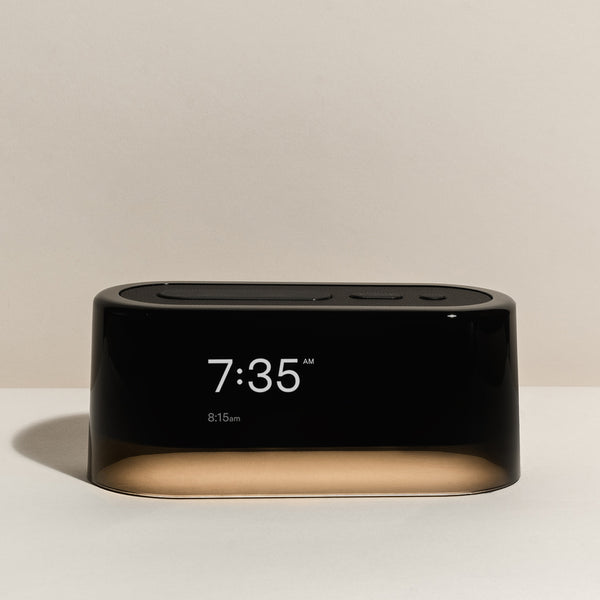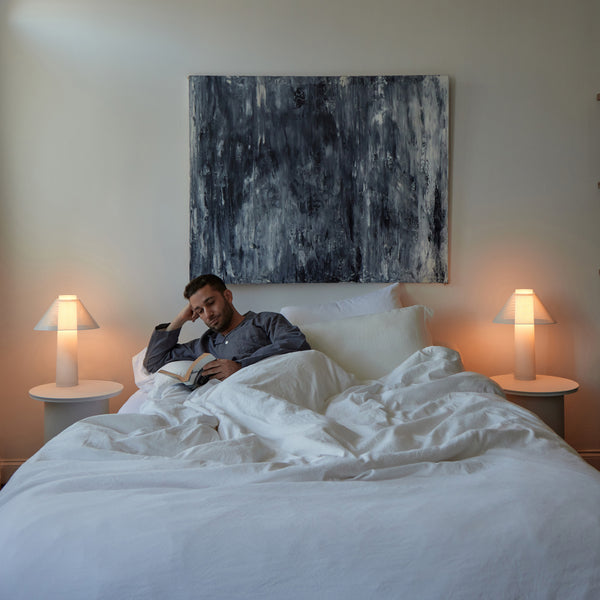From tinctures to skincare, CBD is becoming a go-to ingredient for many treatments. But can it really do all that it claims? And what’s the connection between CBD and sleep? Below, we break down cannabidiol (CBD), how it affects sleep and the body, its various forms, and sleep aid alternatives.
Effects of Taking CBD
CBD (cannabidiol) is one of the 100+ cannabis compounds found in hemp. You might be more familiar with THC (tetrahydrocannabinol), a strain commonly known for its mind-altering effects. Both THC and CBD activate the body’s natural endocannabinoid system which is a complex network in the brain that regulates the nervous system, hormone and immune systems.
Unlike THC, which can cause heightened sensitivity, euphoria (and for some, paranoia and increased appetite), CBD is non-psychoactive. So many find that lower doses of CBD can be stimulating for the brain while higher doses act as a sedative.
Research shows that CBD has a calming effect on the nervous system by boosting serotonin levels in the brain to improve mood. When serotonin levels are balanced in the brain we feel happier, calmer, less anxious, and more emotionally stable. Sleep studies suggest that serotonin deficiencies can be linked to anxiety and insomnia. One study found that 80% of participants who used CBD for anxiety reported lower anxiety levels within a month and 65% reported improved sleep.
How can CBD Help with Sleep Disorders?
Anxiety at night is often connected to sleep disorders like insomnia. Typically, levels of cortisol (the stress hormone) peak in the morning, but if you have insomnia then you experience this heightened level of cortisol at night, which can also lead to increased anxiety about falling asleep. Experts suggest that anxiety and insomnia usually contribute to the other. In 2013, researchers found that treating sleep disorders like insomnia could potentially prevent anxiety and depression from developing. And a more recent study from 2019, found that those who experience insomnia symptoms are vulnerable to feelings of anxiety during times of stress.
CBD is commonly used for anxiety treatment but does CBD help with sleep? Studies suggest that a high dose of CBD before bedtime can help improve sleep quality in those with chronic pain, anxiety, insomnia, REM sleep behavior disorder, and many other sleep disorders because it calms the nervous system. A pilot study is underway to examine the effects of CBD and THC in individuals with chronic insomnia.
In a small study of four patients with Parkinson’s disease, CBD helped decrease their REM sleep disorder symptoms from 2-7 disturbances per week to 0-1 per week. REM sleep disorder occurs when the body doesn’t undergo temporary paralysis that happens in the REM (rapid eye movement) sleep stage to keep your body safe while dreaming.
What Forms Does CBD Come In?
If you’re interested in using CBD, you have a variety of concentrations and dosages to choose from. Exact doses of CBD for sleep are unknown but a 100-person study that tested CBD doses ranging from 25-175 mg in people with anxiety and sleep disorders over the course of three months, found 25 mg to be most effective for treating anxiety. The study concluded that higher doses were needed for sedative effects. Researchers also found that the use of CBD for sleep may experience an improvement initially however the effects may not be sustainable long term.
It may take some trial and error to find the dosage that is right for you but the most common forms of CBD are:
- Oral sprays that are applied under the tongue
- Oils and tinctures (drops)
- Vapes and vape juices used with a vaping pen
- Edible gummies, cookies, chocolates, and beverages
- Pills and capsules
- Topical creams, patches, and gels
Other uses of CBD
It’s important to note that only three cannabis-derived products are FDA-approved in the U.S.:
Epidiolex: Approved for seizure treatment in rare and severe forms of epilepsy and tuberous sclerosis complex for patients ages two and up.
Marinol and Syndros: Two drugs that contain a synthetic form of THC that control appetite, nausea, and vomiting. They are often used for the treatment of chemotherapy patients and weight loss in patients with HIV.
Cesamet: Contains a synthetic compound similar to THC and affects the part of the brain that controls vomiting and nausea.
In addition to researchers studying CBD as sleep aid, they are also interested in the effects of CBD on:
- psychiatric disorders
- nausea and vomiting
- chronic pain
- opioid addiction
- depression
- acne
- high blood pressure
- diabetes
Other sleep aids
A sleep disruptor we all know too well are stress and anxiety. They both raise cortisol making it feel nearly impossible to fall asleep. Experts suggest that anxiety at night is often connected to sleep disturbances like insomnia. Using a CBD sleep aid isn’t the only treatment for sleep disorders like insomnia, a variety of methods include:
- Relaxation therapy: A combination of abdominal breathing, progressive muscle relaxation, and focused attention techniques.
- Stimulus control therapy: A set of instructions designed to establish a consistent sleep-wake rhythm and strengthen bedtime hygiene.
- Sleep restriction therapy: Sleep restriction overseen by a professional to increase sleep drive and regulate circadian rhythm.
- Improve sleep hygiene: Calming sounds like white noise, breathing exercises and meditation can improve sleep, you can find all of these options in the Loftie Clock. Another factor is lighting, gradual lighting like the Loftie Lamp can also support your natural sleep signals to help you wind down.
- Paradoxical intention therapy: Those with anxiety about falling asleep are instructed to do the opposite—get into bed and stay awake so fears can arise. This is done with a professional to slowly work to reduce triggers in a supported environment.
In addition to behavioral techniques that can address insomnia there are also medications that have a sedative effect similar to the effects of CBD for sleep. Two options for a sedative effect are melatonin and antihistamines. Medications like Benzodiazepines are not typically advised by doctors because they have a higher potential for abuse.
If you’re struggling with insomnia or other sleep disorders that aren’t responding to treatment it’s best to check with a medical professional for more support.





















